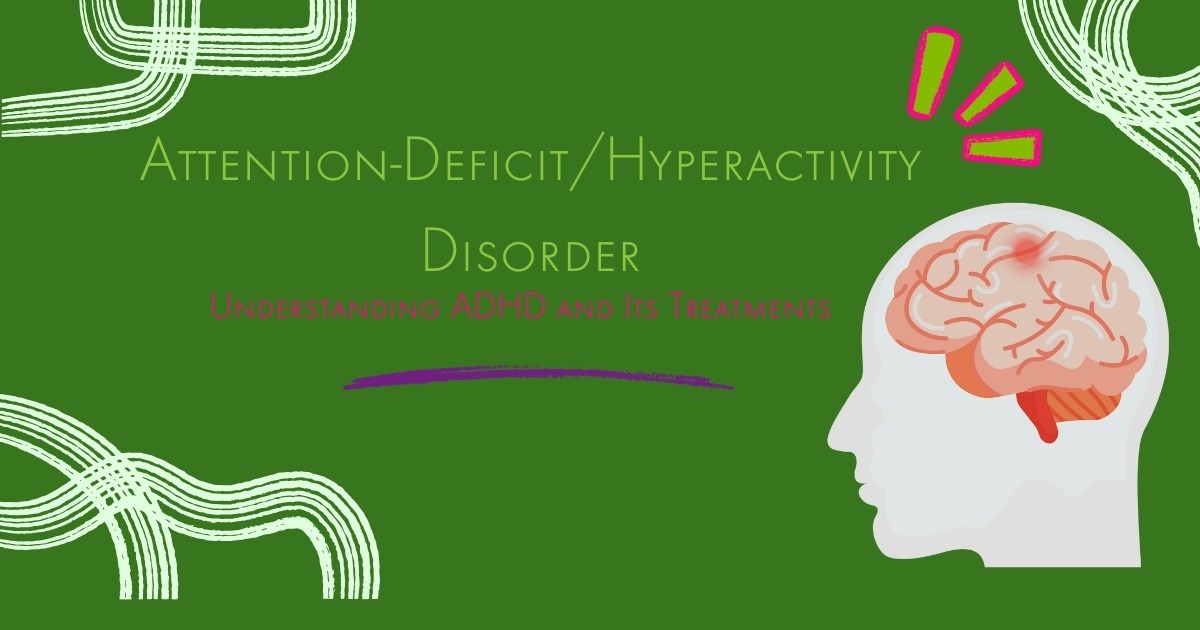Understanding ADHD and Its Treatments
Attention-Deficit/Hyperactivity Disorder (ADHD) is defined as a neurological condition that is characterized by persistent patterns of inattention, impulsivity, and hyperactivity.
ADHD affects both children and adults and often presents challenges across different areas of life, including overall psychological well-being, academic performance, and social interactions. It is a chronic condition that can impact a person's quality of life.
Although there is no cure for ADHD, there are many treatments that exist in today's world to help manage symptoms. Treatments existing today, especially stimulant medications, have become the most popular in ADHD management. There has been a rising concern about the misuse of stimulant medication by non-ADHD individuals.

What is ADHD?
Attention-Deficit/Hyperactivity Disorder (ADHD) is defined as a neurological condition that is characterized by persistent patterns of inattention, impulsivity, and hyperactivity.
ADHD affects both children and adults and often presents challenges across different areas of life, including overall psychological well-being, academic performance, and social interactions. It is a chronic condition that can impact a person's quality of life.
Although there is no cure for ADHD, there are many treatments that exist in today's world to help manage symptoms. Treatments existing today, especially stimulant medications, have become the most popular in ADHD management. There has been a rising concern about the misuse of stimulant medication by non-ADHD individuals.
ADHD: The Symptoms and its Diagnosis
The three main symptoms individuals with ADHD may experience are inattention, impulsivity, and hyperactivity. Signs of inattention are disorganization and difficulty staying focused on tasks. Impulsivity is acting without thinking of the consequences and interrupting others when it's not appropriate. Finally, hyperactivity is the act of constantly moving or fidgeting.
These symptoms must appear before age 12 and persist for at least six months in multiple settings to be diagnosed. These settings can include social environments, school, or work. In children under 16, at least 6 symptoms must occur in various settings. In individuals over the age of 16, there must be at least 5 for a diagnosis.[3]
It is important to note that any of the symptoms caused by these different types of ADHD are not due to lack of comprehension or disobedience but rather due to lower levels of dopamine. Dopamine is a chemical in the brain, characterizing ADHD as a brain-based issue.
ADHD is diagnosed in three different ways: inattentive ADHD, hyperactive-impulsive ADHD, and combined ADHD.- People with inattentive ADHD usually show signs of being easily distracted and inattentiveness.
- Hyper-impulsive ADHD, the least diagnosed, do not necessarily have trouble paying attention but are hyperactive and impulsive.
- Combined ADHD is the most common type and typically shows symptoms of both inattentive ADHD and hyper-impulsive ADHD.[2]
- If ADHD is left untreated, it can lead to additional issues such as anxiety, depression, substance abuse, and conduct disorders.
ADHD: Gender Differences
While ADHD occurs in both males and females, there are some minor differences in how the disorder presents itself and is diagnosed.
Due to more visible symptoms, males are more likely to be diagnosed with ADHD. The most common visible symptoms males present with include hyperactivity, impulsivity, and aggression. This leaves them more at risk of legal issues, including higher rates of incarceration than females.
In contrast, symptoms of ADHD in females tend to manifest themselves more internally. Because females are less likely to be referred for treatment, their symptoms may go unnoticed or might be mistaken for other psychological issues. This leads to females developing poor coping strategies, leading to more complex issues like anxiety, depression, and lower self-esteem. ADHD in females is often underdiagnosed, leading to a lack of appropriate interventions and support needed.[4]
ADHD: Across Different Stages of Life

ADHD symptoms often evolve or change as a person ages:
- Younger Children: hyperactivity and impulsivity are usually the most common symptoms.
- Elementary Level: Struggling academically becomes common, and symptoms of inattention become more noticeable.
- Adolescence: Hyperactivity tends to decrease as restlessness and fidgeting become more prominent.
- Teen Years: Engaging in risky behaviors becomes elevated, such as unsafe sex and substance abuse. They often experience difficulties in maintaining or even forming relationships.
- Adulthood: Adults start manifesting differently compared to children and adolescents. The demands of adulthood, like maintaining a career, relationships, and managing responsibilities, often intensify. They may struggle more with impulsivity, restlessness, and difficulties focusing. These symptoms can develop into irritability, emotional regulation, and a low tolerance to frustration.[3]
ADHD: Treatment Options
Although ADHD has no cure, various treatments are available to reduce symptoms. The common types of treatment are medications (stimulants and nonstimulants), psychotherapy, and behavioral interventions.
Early diagnosis, treatments, and interventions are vital in managing ADHD because, without them, individuals may have further complications later in life. They are more likely to experience substance abuse, anxiety, depression, and learning disabilities. These complications can make it difficult to function in daily things like social relationships, work, and academic success.
- The most common type of treatment is stimulant medications, which work to increase dopamine and norepinephrine levels in the brain. Norepinephrines are the neurotransmitters that play a key role in attention, focus, and impulse control.
- These medications are usually methylphenidate, dextroamphetamine, and mixed amphetamine salts that can enhance attention, focus, and academic performance while reducing impulsivity and hyperactivity. However, while stimulant medications are effective, they are not the only option.
- Non-stimulant medications, including atomoxetine, monoamine oxidase inhibitors (MAOIs), and tricyclic antidepressants, are also used. These medications are less commonly prescribed because they take longer to show improvements and are considered when stimulant medications are ineffective, produce unwanted side effects, or when considering someone who has dealt with previous addictions.[1]
In addition to medication, psychotherapy and behavioral interventions also play a crucial role in managing ADHD. Parent education and school-based programs are often combined with these two types of medication to improve coping skills and overall life function.
Many students with the disorder qualify for educational support under the American Disabilities Act (ADA). This allows them to receive accommodations. Some of these accommodations include extended time on tests, modified assignments, and access to assistive technologies. These interventions create an equitable learning environment and encourage academic support for students with ADHD.[2]
A Growing Concern
A growing issue in today's world has been the misuse of stimulant drugs by individuals without ADHD. Many non-ADHD users take stimulant medications, particularly in academic settings, to enhance cognitive performance, stay awake, or improve focus. Some also misuse the drugs for recreational purposes, seeking heightened alertness or energy for partying. Individuals without this disorder may start to experience other consequences after the misuse. While stimulant medications may enhance cognitive abilities, the benefits are only moderate in healthy people. The risks include developing anxiety, cardiovascular issues, addiction, and even ADHD-like symptoms.[5]
Choosing a healthy plant-based and vegan diet is most beneficial when it comes to:
-
Higher levels of energy;
-
Improved sleep;
-
Aids in energy and overall happiness;
-
Provides a sense of comfort and relief;
-
Could prevent major diseases such as obesity and diabetes;
-
Accomplish weight-loss and management; and
-
Improves mental and cognitive functioning.
There are really no excuses not to try healthier habits in your everyday life. If you are a man or woman looking for specific benefits of adopting healthier habits or just want to know about the general healing properties of herbs. Please remember to comment or post any health questions, or contact us directly!
Also feel free to share any of your favorite recipes to make and share it with the Assuaged community on our ➡️ Share A Recipe ⬅️ page!















